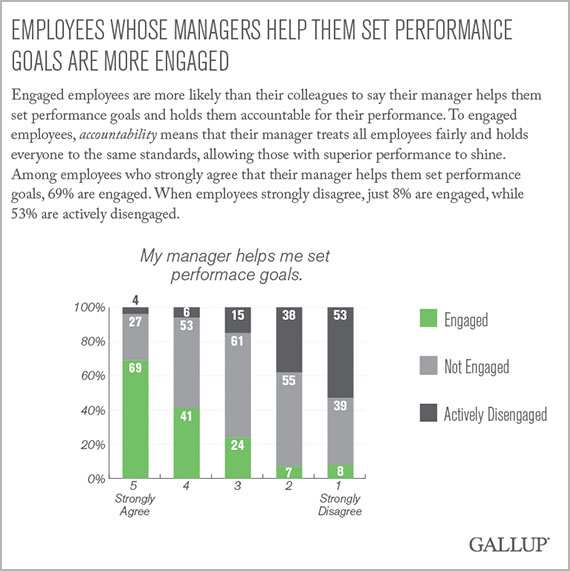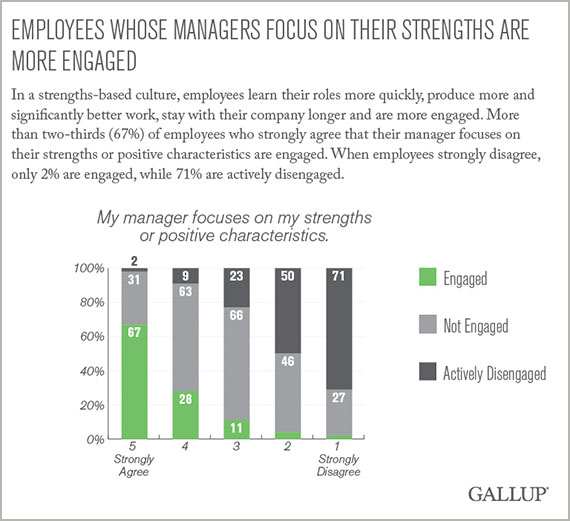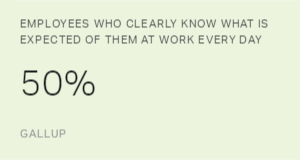Story Highlights
- Managers account for up to 70% of variance in engagement
- Consistent communication is connected to higher engagement
- Managers must help employees develop through their strengths
Less than one-third of Americans are engaged in their jobs in any given year. This finding has remained consistent since 2000, when Gallup first began measuring and reporting on U.S. workplace engagement.
Gallup defines engaged employees as those who are involved in, enthusiastic about and committed to their work and workplace. But the majority of employees are indifferent, sleepwalking through their workday without regard for their performance or their organization's performance. As a result, vital economic influencers such as growth and innovation are at risk.
Gallup's latest report, State of the American Manager: Analytics and Advice for Leaders, provides an in-depth look at what characterizes great managers and examines the crucial links between talent, engagement and vital business outcomes such as profitability and productivity. Our research shows that managers account for at least 70% of variance in employee engagement scores. Given the troubling state of employee engagement in the U.S. today, it makes sense that most managers are not creating environments in which employees feel motivated or even comfortable. A Gallup study of 7,272 U.S. adults revealed that one in two had left their job to get away from their manager to improve their overall life at some point in their career.
Having a bad manager is often a one-two punch: Employees feel miserable while at work, and that misery follows them home, compounding their stress and negatively affecting their overall well-being. But it's not enough to simply label a manager as "bad" or "good." Organizations need to understand what managers are doing in the workplace to create or destroy engagement. In another study of 7,712 U.S. adults, Gallup asked respondents to rate their manager on specific behaviors. These behaviors -- related to communication, performance management and strengths -- strongly link to employee engagement and give organizations better insights into developing their managers and raising the overall level of performance of the business.
Reliable and Meaningful Communication
Communication is often the basis of any healthy relationship, including the one between an employee and his or her manager. Gallup has found that consistent communication -- whether it occurs in person, over the phone or electronically -- is connected to higher engagement. For example, employees whose managers hold regular meetings with them are almost three times as likely to be engaged as employees whose managers do not hold regular meetings with them.
Gallup also found that engagement is highest among employees who have some form (face to face, phone or digital) of daily communication with their managers. Managers who use a combination of face-to-face, phone and electronic communication are the most successful in engaging employees. And when employees attempt to contact their manager, engaged employees report their manager returns their calls or messages within 24 hours. These ongoing transactions explain why engaged workers are more likely to say their manager knows what projects or tasks they are working on.
But mere transactions between managers and employees are not enough to maximize engagement. Employees value communication from their manager not just about their roles and responsibilities, but also about what happens in their lives outside of work. The Gallup study revealed that employees who feel as though their manager is invested in them as people are more likely to be engaged.
The best managers make a concerted effort to get to know their employees and help them feel comfortable talking about any subject, whether it is work related or not. A productive workplace is one in which people feel safe -- safe enough to experiment, to challenge, to share information and to support one another. In this type of workplace, team members are prepared to give the manager and their organization the benefit of the doubt. But none of this can happen if employees do not feel cared about.
Great managers have the talent to motivate employees and build genuine relationships with them. Those who are not well-suited for the job will likely be uncomfortable with this "soft" aspect of management. The best managers understand that each person they manage is different. Each person has different successes and challenges both at and away from work. Knowing their employees as people first, these managers accommodate their employees' uniqueness while managing toward high performance.

Performance Management Beyond Annual Reviews
Performance management is often a source of great frustration for employees who do not clearly understand their goals or what is expected of them at work. They may feel conflicted about their duties and disconnected from the bigger picture. For these employees, annual reviews and developmental conversations feel forced and superficial, and it is impossible for them to think about next year's goals when they are not even sure what tomorrow will throw at them.
Yet, when performance management is done well, employees become more productive, profitable and creative contributors. Gallup found that employees whose managers excel at performance management activities are more engaged than employees whose managers struggle with these same tasks.
In our Q12 research, Gallup has discovered that clarity of expectations is perhaps the most basic of employee needs and is vital to performance. Helping employees understand their responsibilities may seem like "management 101," but employees need more than a written job description to fully grasp their role. Great managers don't just tell employees what's expected of them and leave it at that; instead, they frequently talk with employees about their responsibilities and progress. They don't save those critical conversations for once-a-year performance reviews.
Engaged employees are more likely than their colleagues to say their manager helps them set work priorities and performance goals. These employees also more likely to say that their manager holds them accountable for their performance. To these employees, accountability means that their manager treats all employees fairly and holds everyone to the same standards, allowing those with superior performance to shine.

Strengths Over Weaknesses
Gallup researchers have studied human behavior and strengths for decades and discovered that building employees' strengths is a far more effective approach than a fixation on weaknesses. A strengths-based culture is one in which employees learn their roles more quickly, produce more and significantly better work, stay with their company longer and are more engaged. In the current study, a vast majority (67%) of employees who strongly agree that their manager focuses on their strengths or positive characteristics are engaged, compared with 31% of employees who strongly agree that their manager focuses on their weaknesses.
When managers help employees grow and develop through their strengths, they are more than twice as likely to engage their team members. The most powerful benefit a manager can provide his or her employees is to place them in jobs that allow them to use the best of their natural talents, adding skills and knowledge to develop and apply their strengths.

A version of this article originally appeared on the HBR Blog Network.

